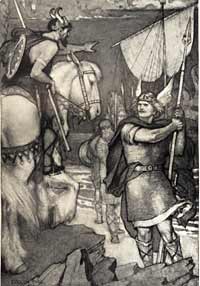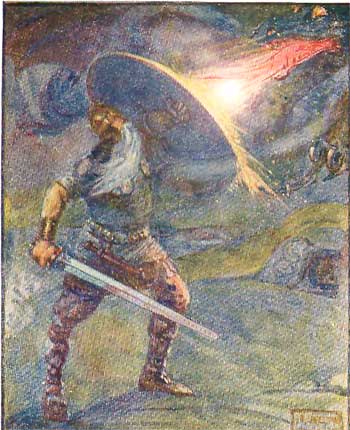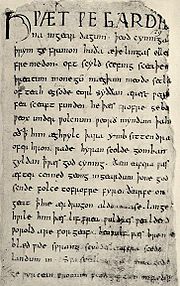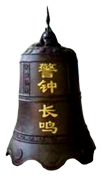|

南开校友和各界朋友交流信息的平台
|
|
鲍凯
鲍凯先生,解放前加入中国共产党,从事地下党工作。 六十年代任教南开外文系,英语 口语教授。

前排右起第二人鲍先生
  
 Beowulf is challenged by a Danish coast guard.
Beowulf is challenged by a Danish coast guard.
(This work of art is in public domain.)
 Beowulf fighting the unnamed dragon.
Beowulf fighting the unnamed dragon.
(This work of art is in public domain.)

"Beowulf": First page manuscript .
(This work of art is in public domain)
|
Beowulf is an Old English heroic epic poem of unknown authorship, dating as recorded between the 8th to the early 11th century, and relates events described as having occurred in what is now Denmark and Sweden. Commonly cited as one of the most important works of Anglo-Saxon literature (see note), Beowulf has been the subject of much scholarly study, theory, speculation, discourse, and, at 3182 lines, has been noted for its length. In the poem, Beowulf, a hero of the Geats, battles three antagonists: Grendel, who has been attacking the mead hall in Denmark called Heorot and its inhabitants; Grendel's mother; and, later in life after returning to Geatland (modern southern Sweden) and becoming a king, he fights an unnamed dragon. Beowulf is fatally wounded in the final battle, and after his death he is buried in a barrow in Geatland by his retainers.
NOTE: Anglo-Saxon literature (or Old English literature) encompasses literature written in Anglo-Saxon (Old English) during the 600-year Anglo-Saxon period of England, from the mid-5th century to the Norman Conquest of 1066. These works include genres such as epic poetry, hagiography, sermons, Bible translations, legal works, chronicles, riddles, and others. In all there are about 400 surviving manuscripts from the period, a significant corpus of both popular interest and specialist research.Among the most important works of this period is the poem Beowulf, which has achieved national epic status in Britain. The Anglo-Saxon Chronicle otherwise proves significant to study of the era, preserving a chronology of early English history, while the poem Cædmon's Hymn from the 7th century survives as the oldest extant work of literature in English.Anglo-Saxon literature has gone through different periods of research—in the 19th and early 20th centuries the focus was on the Germanic roots of English, later the literary merits were emphasized, and today the focus is upon paleography and the physical manuscripts themselves more generally: scholars debate such issues as dating, place of origin, authorship, and the connections between Anglo-Saxon culture and the rest of Europe in the Middle Ages. |
Beowulf
(Translation in modern English)
Prelude Of The Founder Of The Danish House
LO, praise of the prowess of people-kings
of spear-armed Danes, in days long sped,
we have heard, and what honor the athelings won!
Oft Scyld the Scefing from squadroned foes,
from many a tribe, the mead-bench tore,
awing the earls. Since erst he lay
friendless, a foundling, fate repaid him:
for he waxed under welkin, in wealth he throve,
till before him the folk, both far and near,
who house by the whale-path, heard his mandate,
gave him gifts: a good king he!
To him an heir was afterward born,
a son in his halls, whom heaven sent
to favor the folk, feeling their woe
that erst they had lacked an earl for leader
so long a while; the Lord endowed him,
the Wielder of Wonder, with world's renown.
Famed was this Beowulf: {0a} far flew the boast of him,
son of Scyld, in the Scandian lands.
So becomes it a youth to quit him well
with his father's friends, by fee and gift,
that to aid him, aged, in after days,
come warriors willing, should war draw nigh,
liegemen loyal: by lauded deeds
shall an earl have honor in every clan.
Forth he fared at the fated moment,
sturdy Scyld to the shelter of God.
Then they bore him over to ocean's billow,
loving clansmen, as late he charged them,
while wielded words the winsome Scyld,
the leader beloved who long had ruled....
In the roadstead rocked a ring-dight vessel,
ice-flecked, outbound, atheling's barge:
there laid they down their darling lord
on the breast of the boat, the breaker-of-rings, {0b}
by the mast the mighty one. Many a treasure
fetched from far was freighted with him.
No ship have I known so nobly dight
with weapons of war and weeds of battle,
with breastplate and blade: on his bosom lay
a heaped hoard that hence should go
far o'er the flood with him floating away.
No less these loaded the lordly gifts,
thanes' huge treasure, than those had done
who in former time forth had sent him
sole on the seas, a suckling child.
High o'er his head they hoist the standard,
a gold-wove banner; let billows take him,
gave him to ocean. Grave were their spirits,
mournful their mood. No man is able
to say in sooth, no son of the halls,
no hero 'neath heaven, -- who harbored that freight!
|
|
|
   
|

